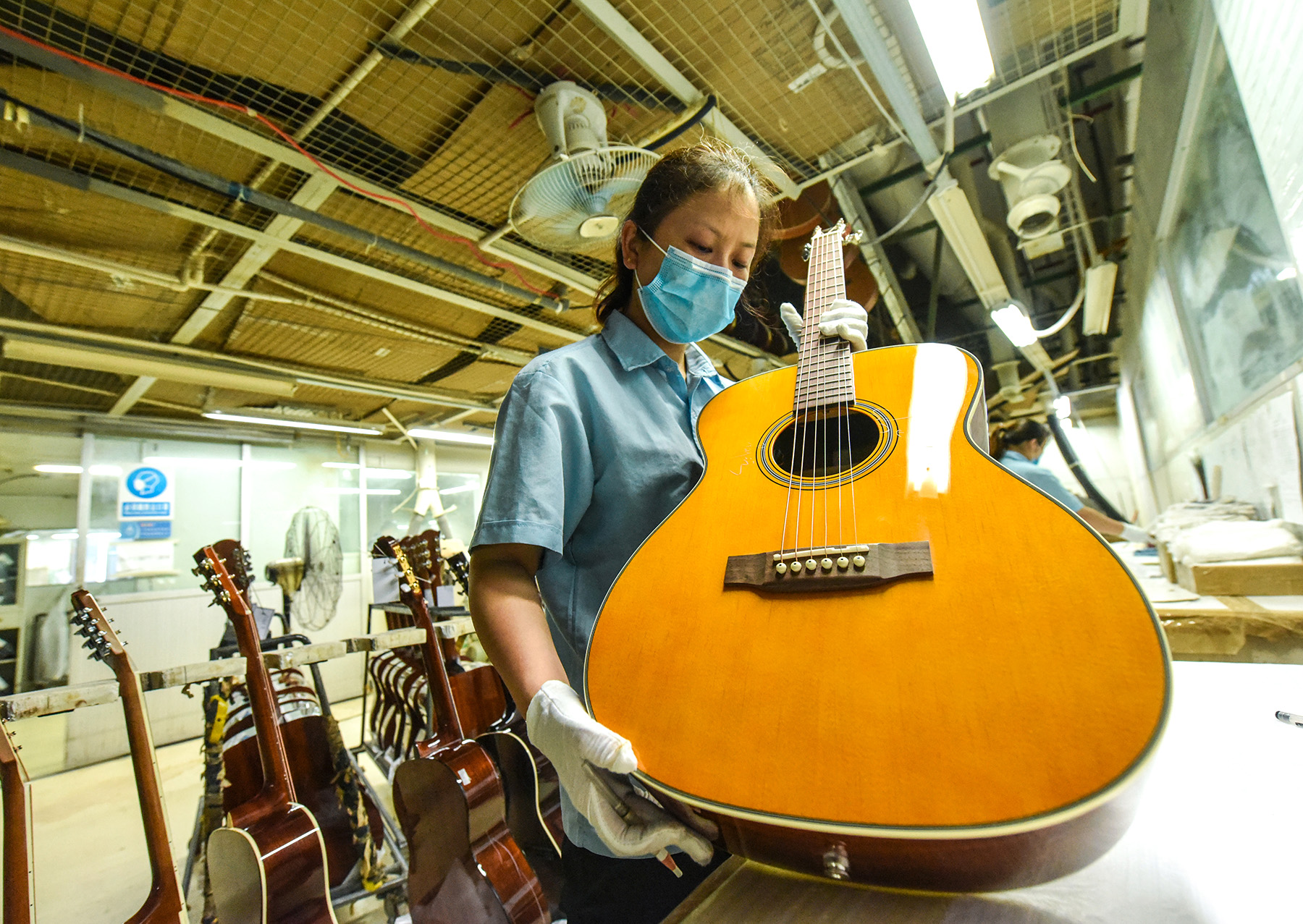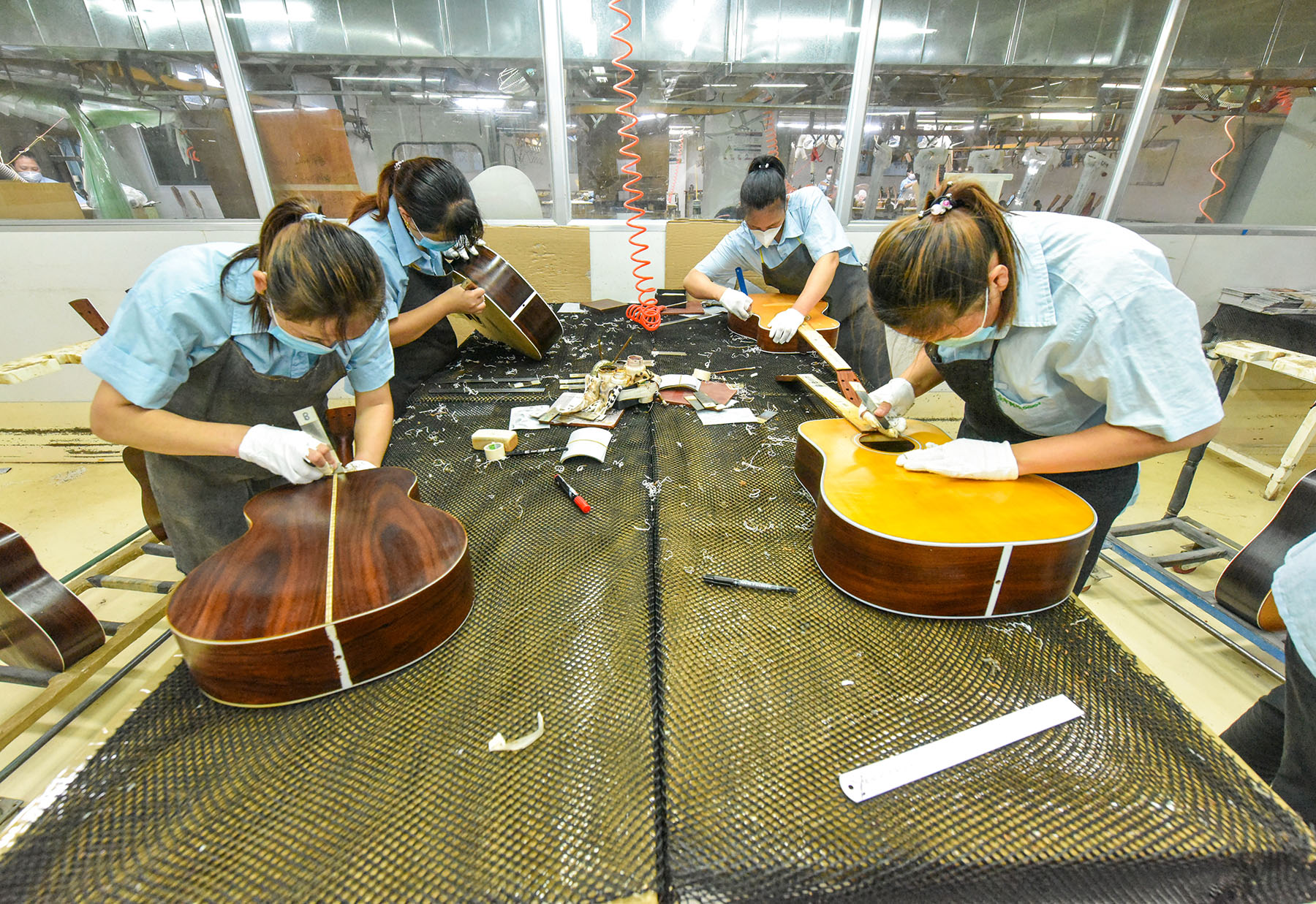A guitar business in Huizhou, Guangdong province, has hit the big time, driven by upgraded manufacturing and a stronger domestic market. Li Xiaoyun reports from Huizhou.

Tsai Lai-feng, general manager of Grand Reward Education & Entertainment Co and founder of guitar brand Farida, shows off an award for “Best New Acoustic Guitar”, won in 2006 for an order of instruments made for an American firm.
“It’s a milestone,” Tsai says, as it marks his company has mastered the technology of mass-producing all-solid wood guitars instead of those made of plywood.
Manufacturing guitars is not easy, Tsai says, explaining the intricacies of the production process. In order to guarantee sound quality, the instrument body’s board should be no more than three millimeters thick. Although solid wood produces good sound, it is prone to warping compared to plywood.
READ MORE: Huiyang: Hub of China’s guitar industry
“The mastery lies in striking the right balance between maintaining structural integrity and achieving superior sound quality,” he says. “We have owned this technology without relying on foreign expertise. Even now, there are still many factories that can’t make solid wood guitars.”
Guitar companies in Huiyang district of Huizhou — one of the nine Guangdong cities of the Guangdong-Hong Kong-Macao Greater Bay Area — have had a “big time”, like Tsai’s building up their brand names and capitalizing on a vibrant domestic market, as the nation’s manufacturing industry continues to upgrade and consumer spending power is on a rise.
Huiyang is home to more than 200 guitar and spare parts manufacturers, nine of which are large-scale enterprises with an annual revenue of up to 20 million yuan ($2.73 million), while 11 are national or provincial technology firms.
Tsai, who is in his 60s, is from the third generation of a Taiwan family steeped in musical instrument trade. As costs in Taiwan rose, his family and business peers considered relocating to the Chinese mainland in the early 1990s. With no direct flights between the Chinese mainland and Taiwan then, many opted for Hong Kong as a transit hub for logistics and capital. As one of the mainland cities geographically closest to Hong Kong, Huizhou saw the creation of Tsai’s Grand Reward Education & Entertainment Co in 1995 and six other guitar factories funded by Taiwan investors.

Brand awareness rises
For almost a decade, the company manufactured musical instruments for US and Japanese brands. This approach changed in 2004 when Tsai decided to set up his own label — Farida.
The same year, a turning point came for Mings Musical Instrument Co, which is also based in Huiyang and specializes in guitar pickups that function like built-in microphones, when its general manager Zhao Yanting led a team to Frankfurt, Germany — a city renowned for its instrument craftsmanship.
Describing the trip as an “eye-opener”, Zhao says it allowed him to observe firsthand the modus operandi of leading global brands, and get to know what branding was. He realized it was time to team up with top-tier instrument labels by bypassing middlemen that he saw as a stumbling block between his products and the real demands of customers.
Before its inception in 1999, Mings relied on intermediaries from Hong Kong, Taiwan and Japan to secure orders. Since Zhao’s Frankfurt trip, the company has enjoyed direct cooperation with industry leaders like Wilkinson and Fishman, and launched its own guitar pickup brand.
Zhao says the company currently serves 80 percent of industry leaders, and three out of 10 acoustic guitars worldwide are equipped with its pickups. About one in 10 acoustic guitars require a pickup, and every electric guitar must have a pickup to function, he says.
In 2020, Tsai decided against manufacturing guitars for other companies, instead focusing on developing his own brand. Besides the fact that returns from the company’s previous operational model had declined, Tsai says the main reason for his decision is that Farida had by then built up a strong base in the domestic market.
Huiyang’s guitar industry has evolved from scratch. According to Tsai, there was almost no supply in the 1990s and he had to rely on imported accessories. The district now has a sound supply chain to feed a company with all the materials it needs in guitar manufacturing. Besides serving industry leaders worldwide, enterprises in Huiyang have created more than 120 independent brands.
Zhao credits the sector’s healthy development to the overall rise of China’s manufacturing chain, which has provided “food and fodder” to guitar production.
Domestic sales increase
Another game changer in Huiyang’s guitar business is a surge in the spending power of domestic consumers, which Tsai says has given him the confidence to focus on the local market.
Recalling the first decade of his company’s operations, Tsai says all its products had to be shipped overseas as local demand for guitars was almost non-existent. With an export price of around $70, guitars were out of reach for most Chinese consumers in 1995 when the average monthly salary of an urban employee was about $55.
Huizhou now produces around 1.5 million guitars and three million ukuleles annually, with about 30 percent sold domestically.
Tsai notes that 20 years ago, Chinese guitar consumption was just two percent of the global market. However, by 2023, China’s guitar market accounted for some 13 percent of the global total, according to Grand View Research — a multinational market consulting firm.
ALSO READ: Shell to expand Guangdong petrochemical complex
At its peak, Huiyang’s guitar makers supplied 40 percent of the domestic, and one-fifth of the global market. However, in recent years, rising costs and favorable measures introduced by competing regions have prompted some companies to move to nearby provinces.
Zhao, who is also president of the Huiyang Guitar Industry Association, calls this a “natural process of the survival of the fittest”, and says he is not too worried about the shrinking number of enterprises. “Although production may have dwindled, the quality remains strong,” he says.
In his view, the real challenge is that the layout of local companies is too scattered, suggesting there should be an industrial cluster. Setting up a museum or a guitar town to showcase the achievements of local guitar companies would be prudent, he says, but it needs money to do all this. Private or government investment may help shape the industry’s future, he adds.
Contact the writer at irisli@chinadailyhk.com


